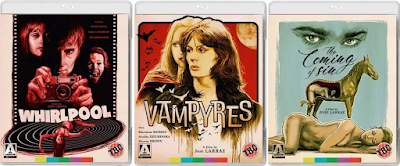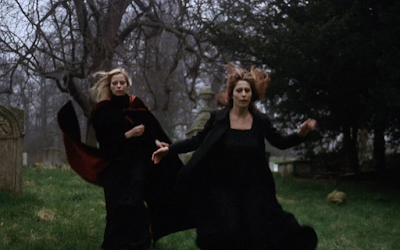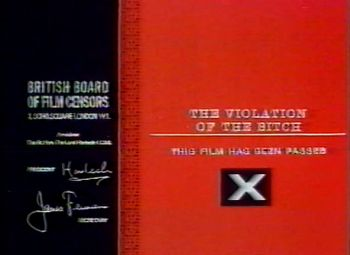Blood Hunger includes three Larraz movies: 1974's Vampyres (aka, Midnight Slaughter, Dracula's Vampire Daughters, Vampire Orgy, et al), 1970's Whirlpool (aka She Died With Her Boots On, Perversion Flash) and 1978's The Coming of Sin (aka Sodomia, The Violation of the Bitch), accompanied by plentiful extras, including commentary by Kat Ellinger for Vampyres, Tim Lucas for Whirlpool and Ellinger and Samm Deighan for The Coming of Sin, parenthesized by comprehensive featurettes, trailers and photo galleries.
Vampyres, scripted by Larraz's spouse, Diana (The House That Vanished) Daubeney, is a feverish sojourn that invokes Carl Theodore Dryer's Vampyre, Rollin's Lips of Blood, Roy Ward Baker's The Vampire Lovers, Harry Kumel's Daughters of Darkness and Bob Kelljan's Count Yorga set, along with such blatant, addiction allegories as Bill Gunn's Ganja and Hess and Larry Fessenden's Habit.
The plot isn't by any stretch complex, but the movie's dreamy execution (and Hammer-esque aura, due to the studio's favored Oakley Court as its prime location; also for the record, featured in The Rocky Horror Picture Show) is its macabre hook.
The story spotlights Marianne (The Lovebox) Morris' Fran and Anulka (Litszomania) Dziubinska's Miriam, bisexual beauties who creep from the English countryside to slash men's throats for inevitable feasting (forecasting the slaughters of Whitley Strieber/Tony Scott's The Hunger). Murray Brown's reserved but curious Ted is kept for a longer period, and though he has the chance to flee, he offers more of his blood, while other gents, played by Karl Lanchbury and Michael Byrne, fall fairly fast. Meanwhile, a good-natured couple, John and Fran, enacted by Brian Deacon and Sally Faulkner, stumble upon the progressing strangeness, with the latter calculating the clues from a van in the voyeuristic vein of Rear Window, Fright Night and Abominable 2006.
The movie was praised by Playboy for its forbidding eroticism, which is understandable, since the gory shenanigans unspool with a playful sensuality that belies its viciousness. Dziubinska was featured in Playboy's May 1973's "Girls of Munich" pictorial, and not to be undone, Morris appeared after the movie's release in the racy British mag, Mayfair. Not too shabby ...
Whirlpool, scripted by Larraz, presents a different brand of horror, taking plot and visual fixtures from Alfred Hitchcock's Psycho and Frenzy, Michael Powell's Peeping Tom, Francis Ford Coppola's Dementia 13, Roman Polanski's Repulsion, William Castle's Homicidal and Strait-Jacket, among other twisted expeditions: tales in which principals, whether by chance or sinful fault, descend into deranged circumstances.
The aforementioned Lanchbury is Whirlpool's lead, Theo, a Norman Bates sort, though cruel on all fronts, with no dual personality to blame. (Due to his fair-haired semblance, Lanchbury resembles actor, Shane Briant, who for the record, would a year later star in Hammer's Psycho-prone, Straight on till Morning.)
Theo and his aunt, Pia Andersson's Sarah, are, in fact, esteemed photographers, who prey upon young women for salacious intent. It appears that one of their models, Johanna Hegger's Rhonda (shown via photos and a flashback) has gone missing. This gives Theo and Sarah the incentive to seek another willing "captive," Vivian Neves' Bardot-ish Tulia, who later discovers the frightful cause of the gal's disappearance. (A businessman, Edwin Brown's Mr. Field, enters the proceedings, determined to locate Rhonda, with whom he had an affair. He behaves much like Psycho's Milton Arbogast, though nowhere near as congenial.)
Neves, who posed for Penthouse, The Times (per a Fisons Pharmaceutical ad) and The Sun, is most provocative, even though her character is flagellant enough to invite her distasteful predicaments. Tulia not only relishes sex with Theo and Sarah (shown from a soft-porn vantage), but even shrugs off being raped by Theo's sneering accomplice (Andrew Grant), giving her avant-garde "boyfriend" the chance to snap photos of the sickly succession in the dubious name of art.
Thanks to Julio Perez (Presagio) de Rozas' lush, rural cinematography and Stelvio (Tentacles) Cipriani's Morricone-swept score, the movie emerges as pure, aesthetic depravity, not quite in league with Stanley Kubrick's A Clockwork Orange, but when it dares to be, damn close. It's worth a watch, but be warned: This one isn't for the morally squeamish.
The story starts subtly enough, with a couple depositing their employee, Triana, played Maren Jensen lookalike, Lidia Zuazo, at the Spanish, rural abode of their artist friend, Lorna, played by the ravishing Patricia Granada. Lorna is happy to harness Triana's services, so that the couple may engage in a long trip to England, thus giving the radiant host sufficient time for seduction.
However, the inexorable tryst comes with a catch. Triana is haunted by dreams of a naked man on horseback, played by Rafael Macado. The unclothed bloke soon proves more than a figment of Triana's imagination, showing up at the house. Triana chases him off and expresses her concern to Lorna, who though willing to discuss the matter, is more concerned with deepening their relationship.
The stranger eventually makes a casual visit (though not before attempting to rape Triana in the nearby field!). He calls himself Chico and implies that he's just a misunderstood, local nature boy with a fervid bent. This brash angle makes him a Pan-like figure to the ladies, in one way encouraging their affair, while insinuating a heterosexual alternative to their coital pact.
Whether friend, foe or a bit of both, Chico leads the women into greater, carnal dependency and nettling confusion. Lorna and Triana are undeniable slaves to each other, damned and/or violated by their insatiable appetites and at least for one, a fatal consequence.
The ending's meaning is open to (mis)interpretation, akin to Vampyres and Whirlpool, weaving an air of contradictory optimism. Depending on one's disposition, this sadomasochistic component can be taken as either good or bad: an expressionistic staple of Larraz's equivocal works.
Larraz is, indeed, a director to (re)discover. Arrow's box set is a wise way to initiate the plunge.
It would be nice if the company produced a sequel set, perhaps catering to Larraz's Symptoms, Deadly Manor and Edge of the Axe, or even such lighter efforts as The National Mummy, The Golden Lady, ... And Give Us Our Daily Sex, though there are any number of compelling entries to help distinguish a welcome queue.
For now, Blood Hunger: The Films of Jose Larraz can be purchased at
https://www.arrowvideo.com/blood-hunger-the-films-of-jose-larraz-blu-ray/12946726.html
















































No comments:
Post a Comment